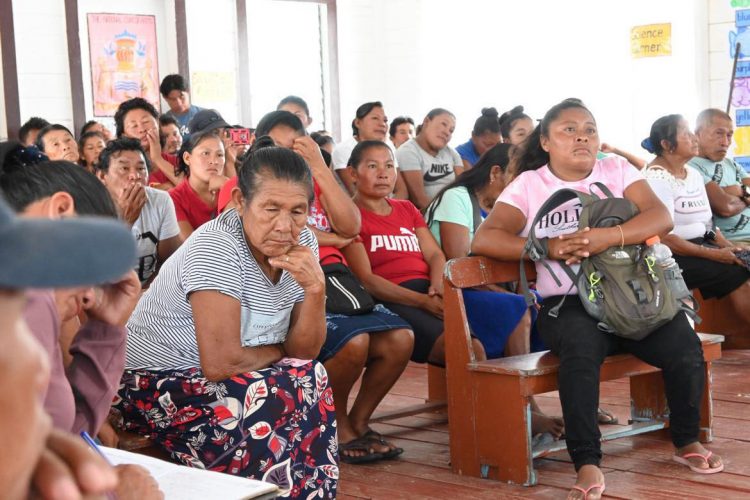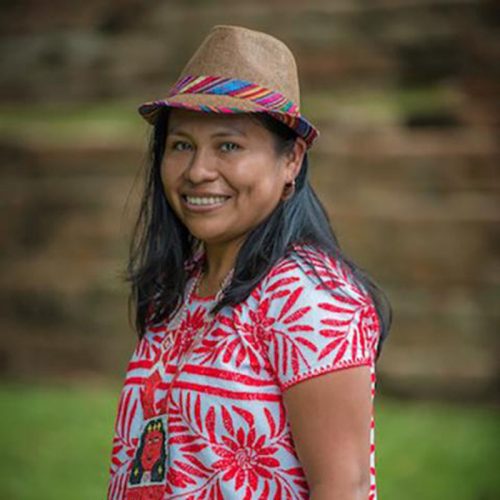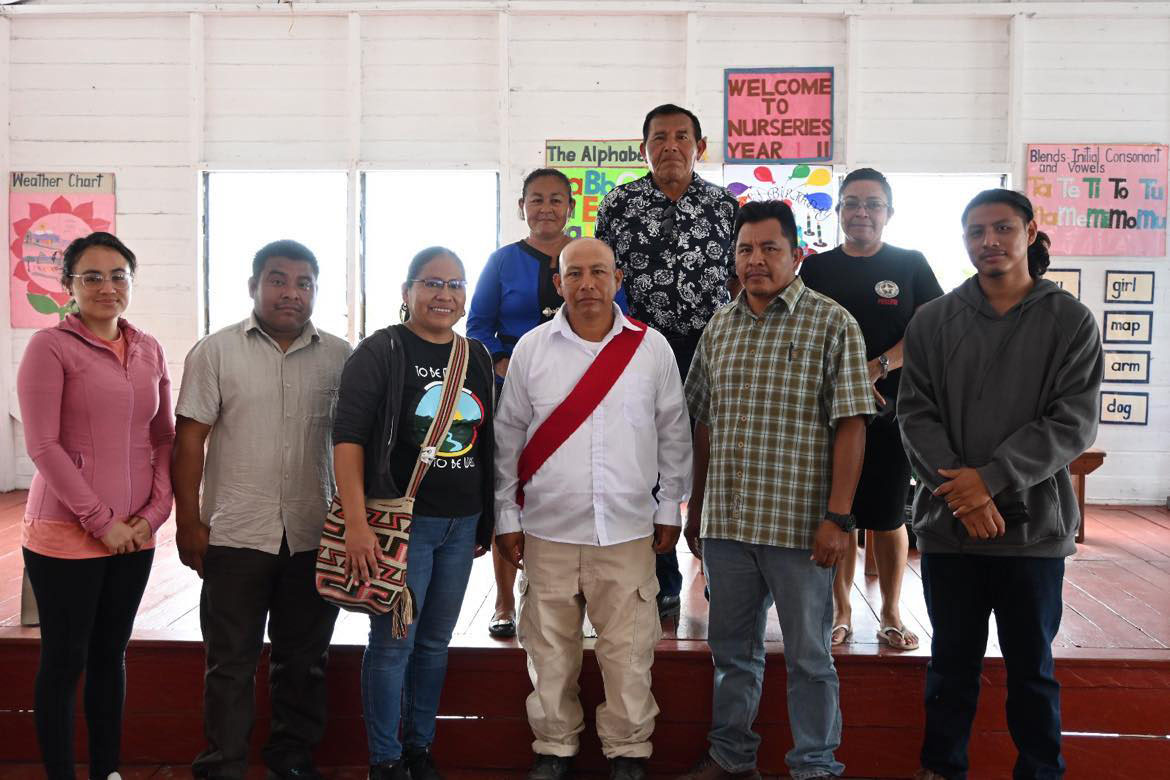A visiting delegation from Belize’s Mayan community has said that there are a number of shortfalls in Guyana’s Amerindian Act, which they hope to learn from and improve on in the legislation currently being drafted for that country’s Indigenous people.
The Guyanese law, the group said, lacks consistency with international law standards as identified by the United Nations Declaration on Rights of Indigenous People and allows for a vast amount of power to be vested in the state.
“I am hoping that we could put forward a model that Guyana too could borrow from. I think that where it concerns Indigenous people’s rights, it is imperative that Indigenous peoples themselves are participating in the development of the legislation or mechanisms that are intended to protect them,” said Cristina Coc, spokesperson of the Toledo Alcaldes Association (TAA) from the Maya Leaders Alliance. Coc was part of a seven-member delegation that visited Guyana recently on a fact-finding mission. The aim was to have an understanding of the effectiveness of the Guyanese Act and what lessons could be learnt.

A Belizean government team last year visited Guyana during the National Toshao’s Conference, also with the aim of gaining knowledge in the crafting of the legislation and as well as social welfare programmes through the presidential grants, job opportunities and upskilling, scholarships for youths and empowerment through the Amerindian Land Titling project.
The government is aiming to implement the legislation in keeping with a ruling by the Caribbean Court of Justice (CCJ) that Mayan communities have the right to own, control, and manage their ancestral lands.
In the 2015 Consent Order arrived at out of the court litigation, the Belizean government is required to develop a mechanism to recognise and protect Maya land rights in consultation with the Maya people.
The order also states that the government of Belize must desist from issuing land titles, concessions, licences or permits without the consultation of the villagers in the Free Prior Informed Consent (FPIC), since the Maya people are now regarded as the landowners.
The TAA visiting delegation, hosted by the Amerindian People’s Association (APA), was led by President of the TAA, Andres Kus; and included Vice President, Domingo Bah; Maya Leader, Ligorio Coy; attorney-at-law, Leslie Mendez-Perez; Community Mapping Coordinator, Donisio Shol; youth representative, Dwayne Cus; and Coc.

The Alcaldes are the traditional leaders from the governance system of the Maya people which represents 41 communities from southern Belize and they play a vital role in maintaining peace and order in their communities and advocating for, protecting, and preserving land rights and culture.
In an interview with Stabroek News, Coc explained that from their visits to communities in regions Two, Four and Seven, they have arrived at the conclusion that the current legislation needs to be revised and take into consideration the views of the Indigenous people.
She said the representatives wanted to have an understanding of how effective the law is to the benefit of the people given that her country’s government was seeking to use the Act as a template for its legislation.
“We were aware that the government of Belize made a recent visit to the government of Guyana to learn from their experience with the Amerindian Act… their exchange fell short in my opinion, because they never really consulted or met with Indigenous communities to inquire about the impacts or the limitations or even the perception of the Amerindian Act where it concerns the people… whose rights it’s speaking to.”
From their visits to communities like Imbamadai, Kambaru, Omanaik in Region Seven, Wakapao in Region Two, and Circuit Ville in Region Four, Coc noted that they have learned that these communities are forced to accept demarcations established by the state. She posited that it is imperative that the Indigenous people be granted their request for extension of land as they are the ones who traverse and protect the land daily. She asserted that Indigenous people should not only be allowed to claim where they live as they utilise the land for farming, hunting grounds for survival and gathering of food. She noted when land is issued to outsiders all these areas are disrupted, placing the livelihoods of the Indigenous communities at risk.
“…Whereas in Belize, our people are very concerned about this. In fact, we have been fortunate to have had our government accept that we would rather and we have a right not to accept the demarcation but rather to pursue our delimitation,” she underscored. She said the imposition by the state to demarcate boundaries is a violation of Indigenous rights.
She added that they observed in some communities that the residents are nowhere close to having access to basic fundamentals such as potable water and electricity.
Coc lamented that while they have observed the communities in Region Seven contributing significantly to the country’s extractive industry through gold mining, the lives of the people are nowhere close to being classified as a developed lifestyle. The communities, she observed, do not share compensation or benefits reaped from their land.
“There is irreparable harm being done to their lands. There’s extensive exploitation of gold going on there with very little monitoring, with very little safety protocols. We saw children walking through gold mines, without any regard for their safety,” she stated.
She pointed out that such a situation is likely to keep existing if there is no consultation and consent with the people.
“What was daunting for us to see was that, you know, while Indigenous lands or wealthy natural resources are often developed, it is not for the communities themselves. Rather they are faced with exploitation. We see the richness of the land being taken away in front of their eyes, and we can’t see the evidence of those kinds of resources benefiting directly the development of those Indigenous communities… people are struggling with basic social services… and these are basic services that Indigenous communities deserve just like every other community…
According to the Mayan representative, witnessing the challenges faced by her Guyanese Indigenous brothers and sisters helps them in Belize to recognise the threats they too could face from the extractive industries.
Powers of the state
She noted that so much power vested in the state removes the autonomy of the Indigenous peoples to make their own decisions and to be self-determining.
“I think the government has a duty and obligation to engage in meaningful consultation with Indigenous communities in order to understand the impacts and the potential irreparable harm that could be done to not just their culture, but their way of life and their environment,” she advocated. “I also think in the Amerindian Act there is not enough to resolve third party interests.”
The TAA spokesperson pointed out that it is imperative to impress on the state that Indigenous people’s rights, “do not become obsolete in the interests of third parties. Regardless of when these perhaps concessions or lands were granted.”
For these reasons, she said, “I am very encouraged to hear that there are efforts to review and perhaps to even advance a more robust Amerindian Act, one that would rely heavily on international law standards where it concerns Indigenous people’s rights. I’m very happy to hear that there is an intention to do a robust consultation.”
As an Indigenous leader herself, she advised that consultation on the revision of the Amerindian Act has to take into account the necessity to build local communities and Indigenous community’s capacity. Indigenous peoples are now thinking about the substantive content of the Amerindian Act, Coc emphasised, before calling for the legal documents to be broken down into layman’s terms so that Indigenous peoples at the grassroots level can recognise where their rights are limited and where improvements need to be made.
“These are inherent rights that Indigenous peoples have. And what we’re trying to do is to have nation states recognise and respect those rights. So, it’s not that the state itself is giving you that right, or is offering you that privilege. It is a right to life. It’s a right to equality. It is a right to justice,” she underscored.





